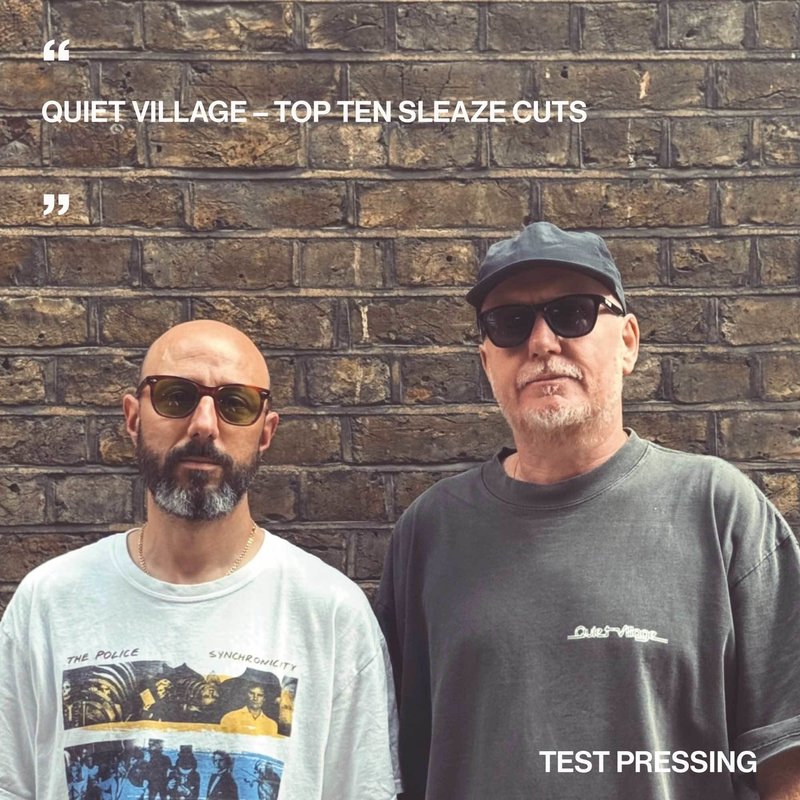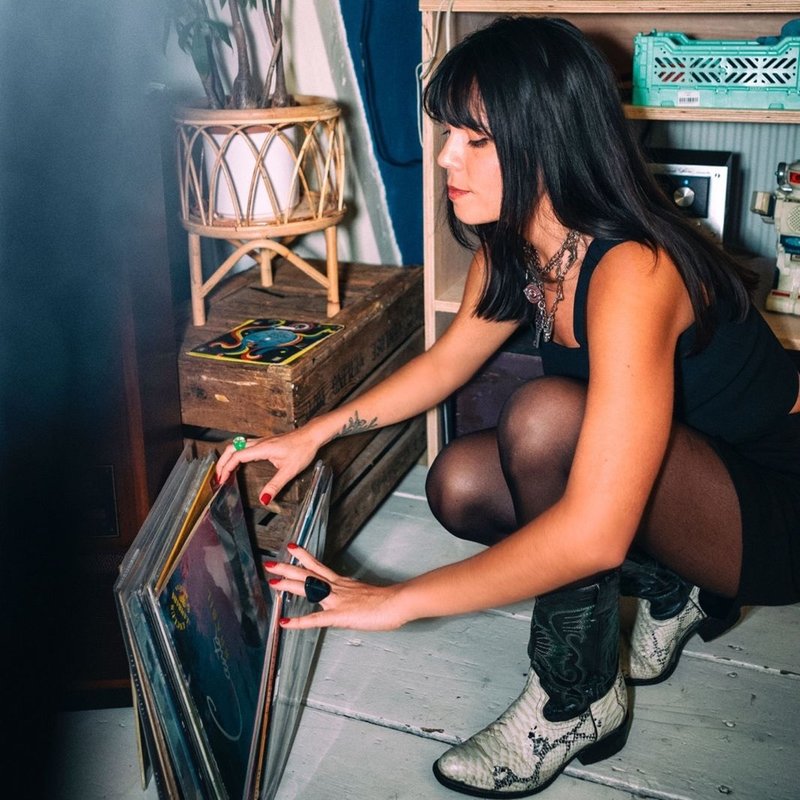
Coco Maria has made her way from her homeland of Mexico across the Atlantic to establish herself as a key voice in Latin music, both classic and contemporary. As a DJ and radio host she is a unique voice, this chat took place in two technologically interrupted sessions in July this year while she was moving between gigs.
Paul East: So, how was Liverpool, have you been there before?
Coco María: Yeah, I've been there a couple of times. Once with the same crew that invited me and it was really nice this time. I think this one was my favorite.
Paul East: Who were you playing with?
Coco María: It's a collective called Otra (curated by Dharma Collective & RoBaSca) they make kind of small cute cozy parties, and they have a very nice audience. I think people who are quite open, and they like to dance but really professional dancers, like jazz dancers and so it really raises the energy.
Paul East: So, where are you living now?
Coco María: I’m in Amsterdam.
Paul East: What took you to there? You’ve lived in other places in Europe before that, right?
Coco María: Yeah, I've been in Europe 20 years. I've been moving around, but I'm now in Amsterdam because of my boyfriend. I have to say it's not 100% my city, but I move here for my relationship.
Paul East: Is it growing on you or do you think you might move on?
Coco María: I don't know. I had this it maybe would take a while or something, because I know how it feels when you really like a city, and you really blend, and do things. But I just don't have that chemistry with Amsterdam. I don't know if it's ever going to grow but it's very good for some things. I appreciate a lot of things. Daily life is very nice and easy and comfortable and safe and practical convenient all these words, but I don't find it so inspiring.
Paul East: Where have you lived, that is inspiring?
Coco María: London, but more Berlin. I think that's the city I felt the most connected with ever. Even more than my own city where I'm from.
Paul East: Why is that? What about Berlin?
Coco María: I now know because I've been analyzing this so much, speaking to friends, speaking to other people. So, I know the answer now, but I took me a while to figure out what it is. It's just something, I don't know the word, I just like the feeling of chaos of cities in general. Mexico City, I love that chaos because it's a chaos that makes sense. It's not annoying chaos. It's a chaos that's playful and it's colorful - it's like Mexico City!
Berlin has that. I think that's why. I come from a country that is very chaotic, and you never know what's going on. You cannot rely so much on your plans. I think Berlin really matched that. But it's just a city that grows all the time. Even when it's difficult for many people, for the cultural promoters and the scenes, there's always a way, there's lots of creativity and lots of people that want to do things. It's just always bubbling, and I felt really more myself and I felt really outgoing there.
Paul East: Even now, Berlin still seems to have that sense of freedom. Whenever I've been there, that's the thing that always comes across. It's like you go out and you sort of feel like anything can happen. You don’t find it in many places.
Coco María: Yeah, that's true. Freedom in many ways. Let's say, I sometimes had a free afternoon and went to The Friday market for example. And then I went to the market and then I have a friend that has a shop around there. So, I just went to the shop just to chat, whatever, have a coffee. There was always someone also having a chat. Somebody else joined later. Hey, there's this exhibition in the street. Okay, let's go. And we all went sometimes. I came home the next day ……
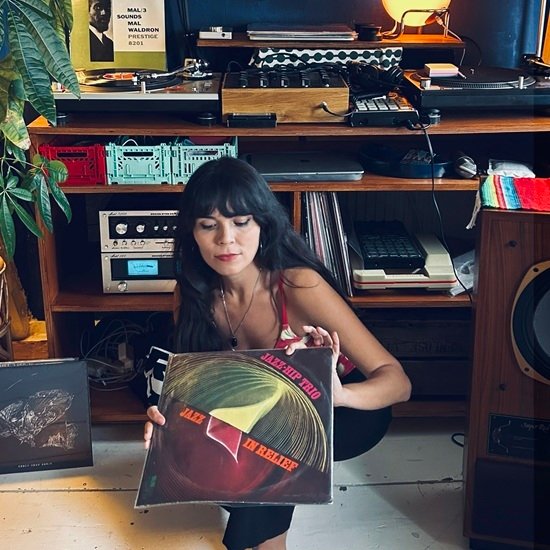
Paul East: For people who don't know, where are you from originally?
Coco María: I'm from Mexico. From the north, not so far from Texas.
Paul East: What was it like growing up there?
Coco María: Growing up there, I really enjoyed my childhood. I think I had a very happy, easy childhood. Where I grew up, it's a city that’s between the mountains and the desert, lots of sun and proper cowboys - like cowboy style! I don't know if you know this genre, Ranchera music? And rodeos, big family, it was the early 90s. So simple, it was a city that was not so big at that time. It’s grown a lot in the last few years. But it was a very pleasant place to live.
Paul East: Did you grow up with music around you, through your parents, your family? What pulled you in the direction that led to where you are now?
Coco María: Mexico is a very musical country and very chaotic. Sounds coming from everywhere. Depending which window is open, some noise there, and there in the house or everybody playing something. Many people are into music.
I think it's a country where people have a very strong sense of what they like to hear. There’s a lot of live music, especially these genres in this area where I'm from, Saltillo, Coahuila. Musica Norteña and Ranchera is the strongest tradition. It’s a sound that’s based mainly on the accordion. I was very lucky to be born into a family that also was really into music. My dad was a musician, but at that time you really didn't have a choice. You need to work.
I have a feeling that if he could have afforded to, he would have chosen a music career or something. He had bands. He was so into music collecting records, and I mean CDs, cassettes too and he's very open musically. At home we would listen to jazz and Brazilian music but also the traditional music and classical music. So, I was born in this surrounding, also lots of family parties. A lot of Mexican people have a very big family, and they were very young. They were all in their 20s and already had kids.
But they were going out too. So, they took us all, my cousins for example, their friends who also had kids. I grew up with many kids going to our parents' parties and at some point, after we had eaten let's say they just let us do our thing. But I have these very strong memories of the adults in a circle playing music, guitar or literally just dancing. And there was not this division. Kids dance there and we dance here, or we are kids, we don't like this music. Everybody was dancing together, and music didn't feel ‘extra’, like background music.
It felt that it was one of the main parts of life, like food, integral to everything, a huge part of life. As a family there was no silence. Every Sunday, it's a Mexican tradition. It's not just my family but every Sunday we went to my grandmother's. Imagine, it was seven lots of kids and grandchildren, every Sunday and my uncle, who was the youngest, he always put these big speakers on the patio. And the house is in an old style with the rooms around and a garden in the centre. He put the speakers there, chairs, and everybody was there. Even if it was just a chilled Sunday, it didn't have to become a party. There was music really blasting, really loud. Nobody ever complained, it’s too loud. No, it was not even a question.
Paul East: So, you had no choice really, to take the path you have.
Coco María: That's true. It was really no option!
Paul East: What about when you got a little older…and you could go out on your own with your friends? Were you DJing or were you a dancer?
Coco María: When I think about going out, I think of these sessions, these parties, with my family were the beginning of going out. When we went, we were expecting something. Also, my parents were up really late. They stayed up sometimes till 4, 5, 6AM. I had to sleep with my cousins on a sofa and in a shared bedroom, everybody like the seven kids there. I have very strong early memories.
I'm happy for that, because I can remember many things from preschool and when I was a little girl, I had a cassette collection, and I would take my cassettes and CDs and ask my uncles to play them. We had a voice as well! So going out was also like that. Then I got a guitar. I went to guitar classes.
I also started to join the adults in these music sessions. And then there was another thing, on Friday morning in my primary school, every morning we had a dance routine. The teachers chose one song every month, made a choreography and every Friday morning the whole school we were in the playgrounds. Then you had all the teachers dancing, each teacher in front of their group and we would follow the choreography and we danced that every month.
I still remember all these songs we danced to at that time, it was normal, but when I look back, I think how beautiful it was. We danced with the teachers, and that's the thing, as people, we didn't grow up ashamed of dancing. It was something normal. In these dance groups in the morning, all the kids had to do it, and it went like this through secondary school. The first time I really felt I'm going out dancing as a teenager was around when I was 12.
It was very lucky I was so lucky I could experience this. It’s something that doesn't exist anymore. But there were some parties called Sonidos parties. That's how we called them after the people who organized the party will rent a sound system…but the sound system also will play the music and they were in my city there were three main ones, but of course there were three main guys, the biggest, and they were sitting behind these speakers with CDs and playing songs. They would set this up in the garage. So many Mexican houses have a garage and a little garden in the front. That was the dance floor, and it was really loud. Nobody complained. The neighbors never called. Police only came when there were fights or something like this which happened also!
But I remember this was also a strange situation, because in school from Monday to Friday, everybody had their role. There were the cool kids, the fashion kids, but I was one of the nerds, the one who did their homework and went to school happy. But in those parties, I was not the nerd. I was really dancing. And I really remember already being very aware of what I like and didn't like, I was sometimes annoying because I went to ask, ‘can you play this one’. That was my first experience of going out. These parties happened really often, it was quite a normal thing, every weekend. Sometimes you didn't have to be invited, you could walk around and there was always one party at someone's house in street, it was beautiful.
Paul East: The sound system culture, like in New York or Kingston or, all these places, it sounds like the same thing. Just people putting on parties in the street basically?
Coco María: Yes, and then everybody who could drive, they were parking on the street, and they opened the boots. You were hanging out there with your friends sitting. It was beautiful. But I don't see this happening anymore. Even when I go back home, I don't see these parties. I think they're not happening anymore.
Paul East: I guess it's harder now. It's more rigid, isn't it? More controlled. People don't want people to do things like that so much anymore….it sounds like around that time maybe you wanted to play the music?
Coco María: No, it happened much more later. I just didn't even think about it, maybe the reason was music was there all the time, but for me there was never the thought that I could do something about this or I could work or this could be my thing.
Of course, I had a little dream that was similar to being a DJ, but it was out of the question, let's say. I was really dreaming. One of my dreams. on my serious list for when I grew up, was a teacher or another was a geologist. But then I also wanted to be an MTV presenter! I used to imagine being an MTV presenter. With my cousins and my brother and my sister, we did lots of shows for our families
Actually, in one of these, we had different segments was me being the MTV presenter. I was really dreaming of this, but I never ever considered music as an option, but then it happened more later when I was already in my 20’s, I think. maybe 10 years later. I went to university. I was playing with my friends in parties for our ourselves and collecting music but never had this in mind until I moved to London.
Paul East: Do you remember the first time you got paid or it felt like a professional thing rather than for friends at a party?
Coco María: Okay, I didn't get paid, but the very first time I was on a flyer, was going to play properly in a party was in London 2012. I played with a friend, and we were booked as a two. It was with my friend Tristan, and we were called ‘Combo Sensation’. It started with really small steps. It was all small steps, until suddenly I was there, and I said, ‘Okay, let's do it’. I had a lot of musician friends in London. I think all my friends in London were musicians. My best friends. All our circle was around music. Although at that time, I was more into live music than DJ sets.
I didn't think, ‘I'm gonna go and see this DJ’, I was going to see lots of bands. My friends were doing quite well at the time, they played a lot of concerts, a lot of festivals, a lot of bars. I was always there and sometimes I needed help playing music between things and that was the first time I could say I consciously thought that this could be a job.
But the very first time I got paid with was my friend Tristan. There were two friends organizing parties. At dinner, we spoke about music, and I was asking lots of questions. How does it work? What do you do? How do you prepare? I was very curious. I had a small record collection, and they contacted me, and they asked me, ‘do you want to open?’. It felt amazing. I prepared to only play for an hour with my friends. It was such a great experience, that place was called Tipsy Bar, it’s still there.
Paul East: How did you find London?
Coco María: It was really opening up. I mean all those years in London 2009 until 2012 were really learning periods, because I had come from Mexico, growing up with this Mexican music. But when I moved to Europe, I got a bit lost, let's say, because when I lived in Mexico I also listened to music from everywhere. But I always thought most of that is music I cannot play here. The music in Spanish or the Latin sound was music I could not really play. But those years in London helped me to understand this is not true. I started to see, to hear, more and more people playing Peruvian Cumbia or Turkish Psychedelia, all in one place. Hearing this, especially at this party where the DJ after us, I remember he opened with a Turkish song and that was for me the beginning. I thought, okay, I don't care. I'm going to go for it. Everything is allowed. That's when, for the first time, I thought I can play what I like. It actually has a place and from there I started to think this could be something. I could do this.
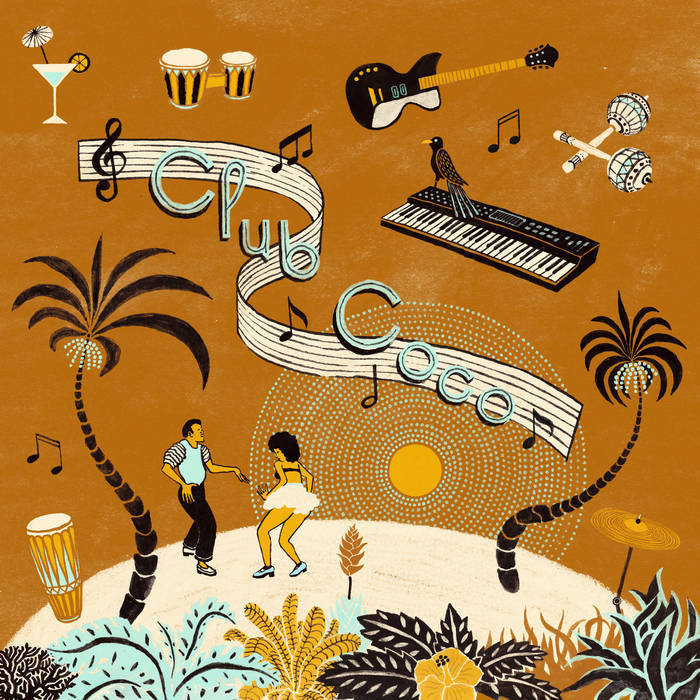
Some technical hitches hijacked the conversation, so we had to pick up a few weeks later, this time Coco Maria was in Berlin….
Paul East: The radio stuff began when you were in Berlin,…And that was through friends. Is that right?
Coco María: Yes, it was in my first radio show happen shows happened in Berlin. Actually, today we had a reunion, because I'm here now and it was in a station called Kashmir radio and was a show that was more oriented in more Latin music.
Paul East: And were there many similar shows going out at the same time or did you feel like you were doing something different?
Coco María: Definitely. At that time, it was the only show on that station that was Latin. I remember, because I have always been listening to radio. I always checked radio stations and then it was a time when you could not hear much Latin music or a Latin focused radio show. At that moment I just thought it was great because I didn't even think it was possible because it was so different. When they asked me to join I was very happy because it was something I could not have even imagined at that moment. No, no,…
Paul East: And were you talking on the mic from the start, did that come naturally to you quite quickly?
Coco María: I wanted to do it, but it's not normal to hear yourself. I was not used to it. You have to get used to wearing headphones, leveling the mic, the volumes, putting down the music. I was keen to do it, but technically I was not used to it. But at Kashmir they started to show me, look, you can hear your voice and put the volume down and it's better to have a background song. Then I started to like it very quickly. I had guests and we would chat. The idea of talking came very naturally, let's say, it's just I didn't know how to do it technically.
For me, with the radio I was always imagining there's someone on the other side listening. So I wanted to speak to them. I want to tell them why I'm playing this song, or I want to talk to my guest. I don’t think I have ever really had a show where I just play music.
Paul East: And you always do it live. Is that right?
Coco María: That's it. Always live. Sometimes I’ve had to record it, but it’s not the same. I always try to do it live. If I could not do it, I just asked someone to cover me.
Paul East: What about Club Coco then? How does that kind of fit into a story as a concept or a thing? How would you describe that?
Coco María: I think it's a puzzle of different experiences I had. I'm trying to recreate what was my radio experience growing up, this feeling when you are in the morning at home in Mexico. In my case it was listening to the radio that is playing in the background, and you hear people sending greetings and it's very animated. Lots of things are happening. It's a bit messy but quite nice and fun. I think in essence I'm just trying to recreate that, because I miss it a lot. What I love about radio is how it's a tool to interact with people. It's a way to talk to the people who are listening. It's a way to connect. I wanted to use that.
At the beginning it was mainly Latin music when I played on Worldwide FM, Caribbean and Latin/ Afro- Latin and that's when it started to be called Coco. Some friends of mine baptised the show, I took the name from them for Coco Maria.
Paul East: So, where does the Coco bit come from?
Coco María: I was Coco Maria already and then I had these friends. They are in a band from England. These friends somehow, they’re always there at key moments of my musical career. For example, I played my first gig at their very first concert. I opened for them. And then they are the ones who got me into Worldwide FM. Then they were my guests maybe a year after, and they had a song called Club Coco. They came with the song on the show, and they played it and when I heard it, I thought this is the name I need. This is the name, because for me it's not like a club, like a member when you get a card. It's a place where you go in and you listen to this music and there's a certain vibe and a certain feeling, a mood. Club Coco made sense.
Paul East: What was the band called? Just so we can name check them.
Coco María: Flamingos. They are not together anymore though. They stopped last year. But at that time, they were really popular. It was like they had a really good couple of years and at that time they were really on a good ride. That was also when I was with Worldwide FM and I made the transition from just playing Latin/Caribbean music to incorporating other styles. That started when I was offered the breakfast show.
Paul East: And is it different approach at different times of the day?
Coco María: Yeah. Yeah.
Paul East: I mean, first thing in the morning I guess is quite a challenge sometimes, or is it? Maybe it depends how many coffees you've had before you start!?
Coco María: Yeah! I already have lots before - always! I really like to do the show, and not make it only about Latin music because I want to reach more people. I don't only listen to Latin music at home. I have many other records that I've collected throughout, the years. So, for me, it was a great chance to play all the other things I like, and when you listen back, it makes sense. You can hear lots of elements of Latin music in other genres. I am a very morning person in general. Maybe not when I sleep very late(!) but in general. I really like to make the most of the morning. For me, a morning show is perfect because I think it's when I have the most energy. I can transmit that. I feel if I have a morning show, I think I can release that energy there.
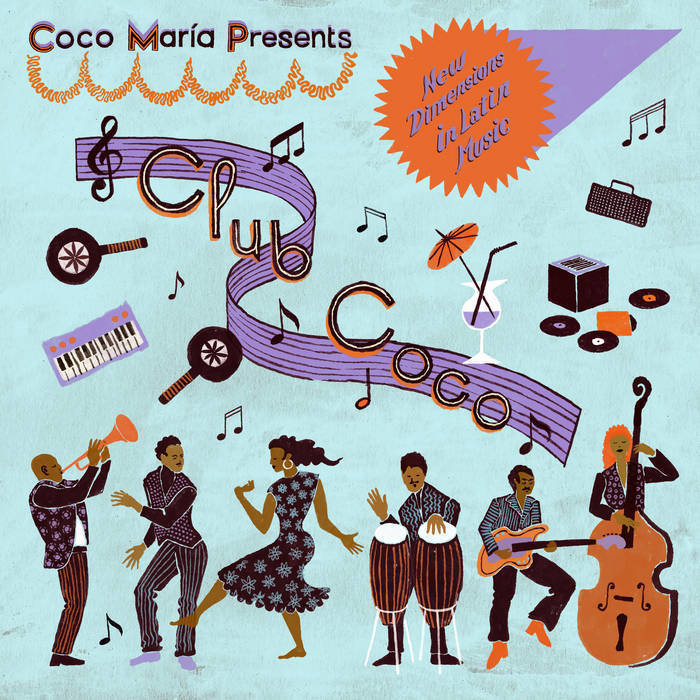
Paul East: What are you listening to at home at the moment?
Coco María: The thing is, for the last month I have not been much at home unfortunately. I'm carrying my records and lots of stuff. I don't know what happens to me when I'm traveling a lot and playing music here and there. When I come home, I don't feel so much like being me who is playing the music. When I'm home I'm listening to the radio a lot, but it's a radio station from Mexico. We have a very cool internet radio in the kitchen, and you can tune in to any station that is online also. And there is these couple of stations I go back and forth, but they are both in Mexico.
Paul East: What are they called?
Coco María: One is Elon El Fonografo in Mexico City and that's the station my grandmother used to listen to. I grew up with this station and the other one is called La Ranchera Aguascalientes 106.5 and it's different, also there's another one I listen to a lot from San Antonio, Texas which is very close to my city in Mexico (La Preciosa). They play all these songs I grew up with in Mexico there's all these genres of music but in the border with the US. They play that a lot, and it's also quite nice to listen to a mix of Spanish and English because now in my life I live in English also so also to hear something that is in both languages. It comforts me to hear those stations that are playing at home at the moment.
Paul East: They remind you of home…. do you think in Spanish still or English?
Coco María: Both really. Sometimes I hear myself because I speak when I'm alone, and I often say things out loud to myself. ‘I have to do this today’, and I say it in English sometimes. I think it depends what it is. If it's music related it often comes in English, I guess because it's the language I communicate in. I also have a notebook, and I write mainly Spanish but once in a while it comes out in English.
Paul East: How was America then? How did that go? (Ana Maria had just got back from Texas)
Coco María: Yeah, it was really fun. I met some very interesting people that are doing really good projects in Texas, and I really had a good time in music. San Antonio was special for me because it's a city I knew as a child, but now I can see another side of it. Also, we had lots of people very excited about the music and it was really lovely.
Paul East: Can we talk about the new compilation then? It's coming out on your own label.
Coco María: Yeah, that's right. On my label.
Paul East: What made you decide to go on your own or do it yourself this time? The two before were on Bongo Joe, right?
Coco María: I was working with Bongo Joe and they were great and I really appreciate how open they were to my ideas and my suggestions. I think it was a really good combination, and I learned a little bit about the business part. But what made me want to do this and take a new path is that everything I do is with people and artists. I have all these relationships with all these creative people. Now these relationships can grow into making a record together. I have all these ideas and I thought having a label will give me more freedom to do it as I want to do it. Exactly as I want. It felt like a good step to create my own platform and navigate through this musical universe in my own way. I'm now understanding it's really tough it is not just fun, but I feel like it will give me more freedom.
Paul East: What's your favorite track on it? or you Is that too hard to say?
Coco María: I don't want to say, no.
Paul East: Is it old and new music?
Coco María: No, it's all new except one.
Paul East: Were they artists that you've discovered or did people come to you or how did it work putting it together?
Coco María: A little bit of everything. Some artists I met through playing or through friends and a couple of people send it to me when they heard I was putting this together. Some friends spoke to other friends and then I got contacts, and I included them because I thought it would match. But most of the artists, as in the previous two compilations, are friends, people I knew, and I asked them.
Paul East: And was there anyone that you wanted that you couldn't get?
Coco María: There was just the one song that was not ready on time. But I'm still thinking we could release it later. It's a remix of an old song of a song I have on the previous compilation, it's a remix by an artist I respect very much, and I was really excited to have it, but it was not done. It was not finished, and we had to finish the process. So, I hope we can still do it on another release.
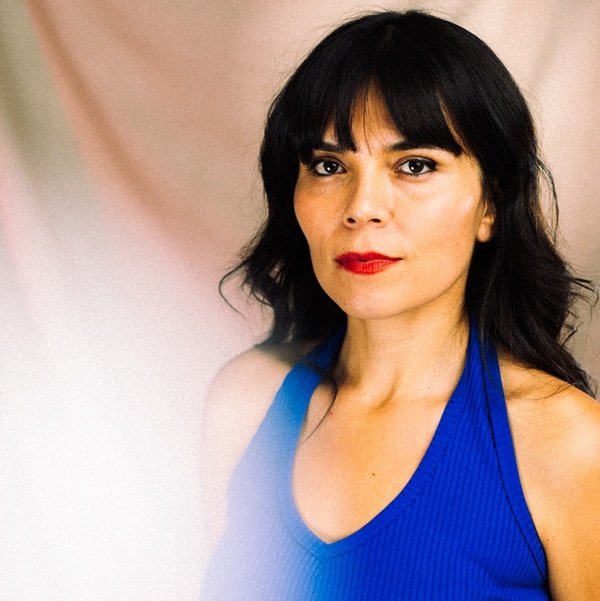
Paul East: How would you describe it to someone who maybe isn't familiar with the other compilations?
Coco María: I would say it's an album that puts together different sounds of artists that are reworking, recreating or keeping alive the Afro Latin sounds. It's all modern. I have a lot of compilations that are focusing on older music, and I like that too because they help us find out about music that we didn't know. And that turns out to be the basis for a lot of music that we now listen to. History is good to know what sounds were there before, who was there, who were the names. What were the scenes? That's nice. But I wanted to hear something that is happening now. And with this compilation, I connect both worlds. I connect the bands that are there out there touring, selling tickets, still alive, but that are very inspired by the older sounds.
So I thought that's why these artists and this compilation. They are contemporary artists that are inspired by the Afro Latin sound that we know already. But they add their own touch, their own twist, their own productions. Some are not even from Latin America. So that's also interesting, because then you can hear how for example in this case Italian artists can reinterpret the Latin sounds. It is something not traditional, but they still feel inspired. What is the result of that? That's also what I wanted to show.
Paul East: I know this coming very soon, but have you got things that you want to do afterwards that you've got in mind, or are you just going to see how this goes first?
Coco María: No, we have some plans already, a couple of releases that are getting ready, but not ready enough to announce them, but they are on the pipeline. One artist that is already in the compilation and he's called Charlie Chimi but this is going to be, I feel, the first proper release after the compilation for the label because it's a full album. Not to say that the compilation is not a proper release, but I think the compilation is an aperitif, so you get a plate of all the different sounds that represents the label. And Charlie Chimi is one of those, but he's going to be the full course.
Paul East: And beyond the label, how about you? What are you planning?
Coco María: In the summer I focus on gigs and traveling and keeping the energy for that, because it's a lot. For my radio shows, I'm focusing on them not so much during summer. But right after, I want to pay more attention to my radio shows because during the summer, I don't really give as much attention to them as when I'm at home. I prepare much better, and my selection is more thorough and I prepare a bit better. So, I really like the moment when I come home after the summer to focus on different things.
Club Coco: New Dimensions in Latin Music is released on 26 September and available via Bandcamp.

